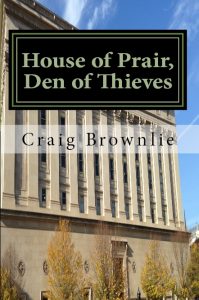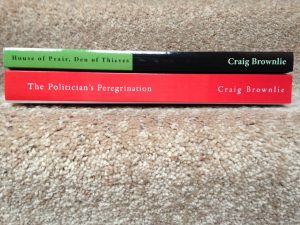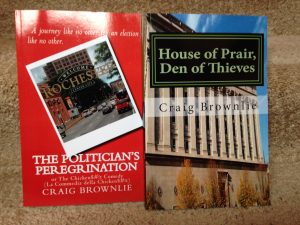Buy the book and then read the notes!
Back in the halcyon days of the late 2000s, the most visible way to express your support for a particular candidate was to place their sign in your front yard. You could always drag yourself to one of their rallies or really go crazy and volunteer for their campaign. Sure, Uncle Screwloose might drink a little too much at the family picnic and spout some opinion that the rest of the family would disavow to a greater or lesser degree. After all, Uncle Screwloose had been a known troublemaker his whole life without enough brainpower to light a candle.
Like many people, Uncle Screwloose had a worse opinion among his family than he did among his friends, who called him Frank and generally saw the wisdom of his thoughts because they heard those thoughts when he was sober. Also, they had chosen to frequent the same social activities and live in the same neighborhood.
I was frustrated with the level of political discourse ten years ago (truth be told, that had been the case for a long time). I knew that I had something to say, but I had no way in. As a nation, we seemed to have forgotten many of the qualities to which we had long aspired. That’s the important piece, however. We aspire to be a nation that is blind to a person’s race or faith. We aspire to be a nation that protects the minority from the tyranny of the majority. We aspire to give power to the people through representative democracy.
I felt myself throwing up my hands in the face of arguments that seemed calculated to reduce and change our aspirations. It used to be that we only had to worry about learning prejudices from our elders- now our elders are better people, but our media and our leaders have become vile. Must we really argue about stem cell research when we could be providing healthy meals in our schools? Do we really need to divide ourselves about abortion and guns when we ought to be united about bridges and cancer research? Has anybody really thought about how hard the mainstream political parties have had to work to find issues that make us think we are a nation filled with internal conflict? Isn’t a lot of this no different from dryer lint? You didn’t know it was an issue with a good side and bad side until someone told you. People faced with making decisions about guns or abortion probably had enough going on in their lives that no one needed to throw politics into the mix. Where empathy and support go, politics should not follow.
Within academic circles, Magic realism seems to become all the rage every other decade. Someone rediscovers the fact that South Americans have written books and the graduate theses practically write themselves. Then you have people like me that just like the words. “Magic realism” practically rolls off the tongue if you are a writer with an overactive imagination. Combine that with a notepad at bedside and you will find some weird starting places for stories.
So, Magic realism gave me an in. The useless talk of pundits who depended on false dichotomies made it seem to me that the best way to talk back to them might be with the powerful voices that they claimed to represent. Thus, I picked a few choice characters from mythology.
The book is a ramble round Rochester with a very unlikely batch of heroes. Hercules always seemed like a given. I made a list with too many possibilities. Once Hercules came alive, the others fell into place. For the record, I would probably stay on the phone with him if he cold-called me (read the book).
Cyril Brand is not terribly likable at the beginning, but he grows on you, hopefully. He has grown on me. The most interesting discovery for me was how he gains a certain nobility through his tragedy. When I was planning the book, I fully expected him to succumb to the needs of the Senator’s campaign. Death always seemed to be his likeliest path to redemption.
What’s with the Italian and the opera references? The tone of the book proved a challenge. I felt that it was important to avoid any distancing irony, which may be a weird thing to say when you dress Gilgamesh like Philip Marlowe. Operas tend to run to the extremes of emotional expression without much self-comment. Aida might tell you that she is about to die, but she never reflects on her demise with a smirk and a witticism. I knew that I would be dealing with situations that bordered on the ridiculous and wanted to allow room for the humor. At the same time, I knew what was coming and felt that it would do a disservice if I failed to write the pain as anything less than a reality. Sometimes operatic-level emotions do intrude into our lives. At other times, we are trapped in a theatre of the absurd.
Strange as it may seem, I think the book offers a reality check for anyone lost in the political discourse of social media. Tweets and posts and blogs are no more considered thought than Odin or Uncle Sam are actual people. The speed of the Internet outraces our ability to think clearly. We all sound slightly intoxicated (remember Uncle Screwloose) when we post because some part of us recognizes just how ephemeral those thoughts are. The weight of all the political posts on Facebook is as nothing compared to the death of a single soldier.
Why Rochester? The city is an anomaly in my experience, having maintained a decent standard of living through successive downturns in the businesses that made the place thrive in the first place. Still, the symphony and the theatre survive. The many universities no doubt offer some explanation. I knew that any candidate worth his salt would pay obeisance at some point to the monetary spigot in Rochester. Once I had the locale, the locations that would be visited became… a challenge. Businesses came and went even as I wrote. In the end, I worked with almost all real places, but they may have been altered to fit the needs of the story. I would not use the book as a map, but that doesn’t mean you couldn’t make a night of it. Who knows who you will run into?


